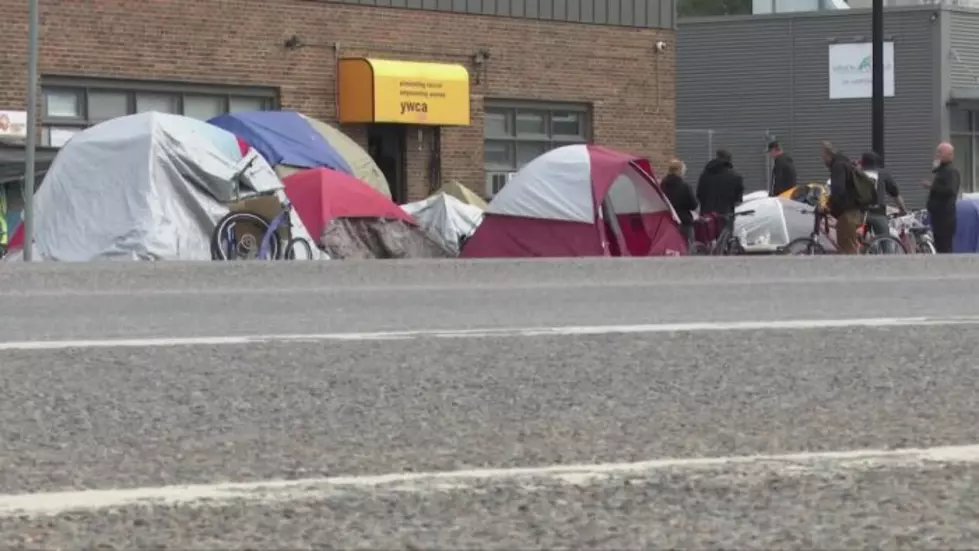
Questions over security at Missoula’s homeless shelters overshadow program successes
When the City of Missoula and its partners at the Poverello Center opened a new winter shelter in 2020, it came with a pledge to ensure the surrounding neighborhood remained safe.
That promise later resulted in a security contract with the Rogers International. Signed last year after long conversations between homeless advocates, neighborhoods and businesses, the agreement is scheduled to run through the end of this year.
But while the program has been successful on most accounts, at least two newly elected members of the City Council question the need for security around the city's homeless operations. The comments this week prompted other members of the council to suggest they do their homework on what led to the security contract in the first place.
“Security is really intended to keep residents, neighborhoods and clients safe, and really minimize client-law enforcement interaction,” said Emily Armstrong, the city's Reaching Home coordinator. “We were hoping and we're now seeing that interactions with security have minimized calls to law enforcement. Calls were down by a pretty significant amount.”
The city launched Operation Shelter in May 2021, providing winter shelter on Johnson Street, a temporary safe outdoor space and an authorized camp site to address homelessness. Other aspects of the project are in the works, such as a transitional motel shelter and supportive housing.
But the winter shelter on Johnson Street isn't new and dates back to the onset of the pandemic in March 2020 when the Poverello was forced to reduce its capacity under CDC guidelines. Soon after the Johnson Street shelter opened, area residents began to express concerns over safety, an increase in vandalism, drug use and drug paraphernalia.
The contract with Rogers covers four neighborhoods including Hawthorne, Johnson Street, the authorized camping site and the city's temporary safe outdoor space.
“This is being mindful of providing some support for the neighbors around these sites. Their concerns are valid,” former City Council member Julie Merritt said in October. “Unfortunately, there’s some bad behavior associated with some of the people at these sites. It’s a small number of people causing most of the problems. I hope the security is successful in curbing some of the bad behavior.”
Homeless advocates at the city said the security contract also has prevented a repeat of the tent camp that sprang up outside the Poverello last year. The contract also required Rogers' security personnel to undergo training on a range of topics including cultural sensitivity, Native populations and LGBTQ plus.
But two new council members are now questioning the need for security.
“I don't know why we have them patrolling neighborhoods rather than just sticking around places where the folks are staying,” said Ward 6 council member Kristen Jordan. “I've heard through the grape vine – nothing with data – that some of the Rogers folks have been tracking people through neighborhoods that are a fair distance from the shelter spaces.”
Jordan also questioned why a security team and not the Missoula Police Department is doing the work. But city officials noted the intent of the contract was to minimize interaction with law enforcement – something that's been successful thus far.
Armstrong also said the security contract costs $670,000 compared to the estimated $2.5 million for the police department to perform the same work.
“They're patrolling neighborhoods because the initial reason for hiring a security firm was because we were hearing from neighbors around these particular areas that their neighborhoods were feeling unsafe,” said Armstrong.
Ward 3 council member Daniel Carlino also raised concerns of his own over security. He suggested the Poverello had concerns as well, though he based his comments on a letter from last year and not a recent meeting with shelter officials.
He also asked if the security personnel are authorized to use force and if they wear body cameras.
“Why do we go through the process to get body camera footage on all our police officers and yet we just hire a private, for-profit company to have guns and survey our neighborhoods,” Carlino said.
City officials said it was determined after lengthy conversations that the security personnel should be armed, given the nature of their work. They aren't permitted to carry weapons into the shelters unless specifically asked by shelter staff.
Council member Gwen Jones suggested both Jordan and Carlino do more research to understand what led to the security contract and why it took its current form. She also said the city's efforts were making headway on the challenge of homelessness – something that got overshadowed this week due to comments on security.
“There is a much bigger picture here of how many people were housed this last winter,” Jones said. “I'd hate for use to get hung up on the narrative of a 'security force' when a lot of thought went into it.”
